I often say that one of the great joys of reading nonfiction is finding those books that are so educational and informative (making it well worth the investment of time and money) and so well written and engaging that they can also happily be called entertaining. Of course, a book doesn’t have to be funny to be considered entertainment, but the reading has to be nearly effortless, the writing so pleasant or curious or artful that it is not only intellectually enriching but fun. There are plenty of books like this — some of them quite serious, but just so compelling that they are page-turners, as riveting as any good mystery novel.
Memoirs are a genre that sort of cheats at this as they are not attempting (I don’t think) to instruct much and can be written as playfully or as luminously as the author can manage. I learned a lot about Marsh’s life and passions and gained good insight about our times by reading his excellently written Evangelical Anxiety, for instance, but as intensely true as it was, as a memoir, it wasn’t didactic. The reading experience of taking up a memoir, or really good historical writing, can feel like fiction.
Investigative reporting or polemical studies can be righteous and yet dry; they can be vividly written and wrong. The sweet spot is when a book is hard to put down because you want to learn more and more, and that is often because the author explains things with such color and zest that it is a blast being schooled. Praise the Lord for authors who can be educational and artful, informative and colorful, true and gracious. These are the books that, finally, are less about data and facts but about shaping our worldviews. Reading a book like that leaves you changed for good. I’m sure you know what I mean.
Just think of the popularity and respect of esteemed works like Braiding Sweetgrass by Robin Kimmerer or Refugia Faith: Seeking Hidden Shelters, Ordinary Wonders, and the Healing of the Earth by Deborah Rienstra. Think of the captivating writing in Bryan Stevenson’s page-turn Just Mercy or the unforgettable All That She Carried by Tiya Miles or the Pulitzer Prize winning study of fracking in two small Western Pennsylvania towns, Amity and Prosperity by the great Eliza Griswold. I couldn’t put down the very thick Dopesick (Beth Macy) or the very thick Soul Full of Coal Dust (Chris Hamby) and I am still gob smacked by the eloquent prose in the brilliant collection of essays Thin Places by Jordan Kisner which is one of my favorite books of recent years. Curt Thompson can write about faith and neuroscience as if our souls depend on it. Len Sweet has more clever wit per page than any serious author I know. I’ve often shared the joy I find in the writing of Michael Eric Dyson, black-preacher-sociologist that he is. As I will say again shortly, I think James Howard Kunstler’s The Geography of Nowhere and Home from Nowhere are on the short list of the books that most entertained and influenced me. Like Calvin Seerveld’s dense and artful Rainbows for the Fallen World I don’t know who I’d be if I hadn’t read them and loved them so.
Whoa, sorry about all that; I couldn’t help myself. It’s hard to stop once I start listing wonderful books that deliver education and joy; good insight and good writing, gravitas with an aesthetic touch. I suppose I don’t have to convince you of this; you know what I’m talking about.
I would like to tell you about a book that I easily put in this category. It is about very important stuff, but conveyed in a pleasant and engaging way, teaching us much in only about 200 trim- sized pages. I suppose I kept turning the pages because I agreed with the author but even when I knew little about what he was writing about, I was captivated. I think this author is a modern hero, a fine, clear, writer, and his story is one I truly want to recommend to our Hearts & Minds friends and fans. Ladies and gents, allow me to introduce Bill McKibben of Middlebury, Vermont. I think the first book I read of his was the fascinating Age of Missing Information which contrasted a weekend spent with over 100 cable TV channels and a weekend of solitude in the woods; his most enjoyable was the tremendous Oil and Honey, about his activism against climate change and his rejuvenating retreat by learning about bees and beekeeping. His new, quite enjoyable, hugely important, quasi-memoir is The Flag, The Cross, and the Station Wagon: A Graying American Looks Back at His Suburban Boyhood and Wonders What the Hell Happened. Oh my, what a read.
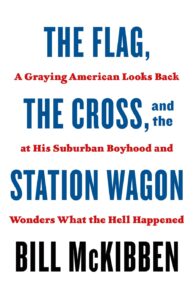 The Flag, The Cross, and the Station Wagon: A Graying American Looks Back at His Suburban Boyhood and Wonders What the Hell Happened Bill McKibben (Holt) $27.99 OUR SALE PRICE = $22.39
The Flag, The Cross, and the Station Wagon: A Graying American Looks Back at His Suburban Boyhood and Wonders What the Hell Happened Bill McKibben (Holt) $27.99 OUR SALE PRICE = $22.39
The format of this memoir is, obviously, in three big parts. But first, why do I say “quasi-memoir”? I’ll leave aside if that is even a word, but the point is made clear in the beginning when McKibben wryly notes that the best memoirs have drama and adventure and pathos and since he grew up in a pretty ordinary, middle-class, stable family, was dealt a good hand and has had a fairly uninteresting life, his memoir, such as it is, is going to be more social history than gut-wrenching autobiography.
McKibben is a prolific author of great renown, actually, and he not only is a professor of note at Middlebury College in Vermont but has founded several environmental organizations. He has travelled the world. His campaigns to do MLK-type mass civil disobedience to try to stop dangerously polluting pipelines and his mobilizing even against the Obama White House is, frankly, quite thrilling and would be, for most, drama enough for several lifetimes, so he’s being a bit demure in suggesting that his life doesn’t have enough angst for a full-on memoir. Maybe that will come later.
For now, though, he uses this storytelling format of recalling moments and eras of his life as a window to see other, bigger things. He has an agenda and it is to illuminate much about the last fifty years of US history and how patriotism, religion, and our consumerist way of life (rooted as we are in suburbs and automobiles) have shaped our culture and the world’s climate, how these things have themselves changed in recent decades, and need now to be reimagined and refined if we are going to rise to the occasion of being faithful in this day and age. That he is finally getting at how to more urgently and effectively mobilize to lower our carbon output and mitigate the disastrous climate change (of which he is an expert) should not surprise anyone who knows him. That he would do so with antidote and charm and a lovely survey of his own patriotism and faith, while not exactly surprising, is a writerly delight and makes for one tremendous book. I am not alone in suggesting this may be his best book yet. (And I’ve got The Bill McKibben Reader by my bedside!)
“Bill McKibben has written a great American memoir, using the prism of his own life to reflect on the most important dynamics in our society. Bill McKibben’s writing is poignant, engrossing and revealing. His message is a clarion call for a generation to understand what happened to their American Dream, and to fight for our common future.” — Heather McGhee, author of The Sum of Us: How Racism Costs Everyone and How We Can Prosper Together
THE FLAG
This is a fabulous couple of breezy chapters – not long — where McKibben shares his own passion for US history, especially colonial history. You see, he grew up in Lexington, Massachusetts, and worked as a teen as one of those New England historical interpreters, wearing his tricorn hat and waxing eloquent about the shot heard round the world and the nearby Battle of Bunker Hill and Paul Revere’s famous ride. He knows that stuff cold and his retelling of it is vital, and with enough local color and backstory to make it captivating. In memoir fashion, he is telling us of his telling of it (a standard colonial-era joke, playing the board game Risk while waiting for the next crowd to arrive, his “half hour spiel” to “maybe one family with a couple of bored teenagers, maybe an entire bus of Japanese tourists” and holding out that hat” to collect tips, which was his summer job pay.) This respected scholar and activist-leader and New Yorker writer who is known around the world was a pimply faced kid wearing that three-sided cap and earning tips by sharing his passion for the great US revolution. I loved it, hearing of his love for our country and its founding story.
As McKibben puts it, “I came by my patriotism honestly.” He writes about the account the guides would deliver and the lasting influence of the basic importance of the story,
It was a clean and brave story, and, as I say, it has informed me ever since. The valor of standing up to unjust and arbitrary power seemed to me its clear and obvious moral. Indeed in the years that followed, as I read more deeply in American history, the importance of that stand sank further in.
I want to talk about that – to tell how and why the Revolution came to seem so important to me. I want to draw the picture in as bold lines as possible. Because soon enough the picture is going to get much more shaded, much less noble. But not quite yet.
Here it gets even more interesting and provides good instruction for many of us. He tells briefly about the important work of the 1619 Project and what new insights it brings to our understanding of our nation’s early history. He is embarrassed that his teenage job holding forth about the revolutionary years in Lexington didn’t have him telling the truth about the indigenous people nor the role of enslaved people (or black freemen like Crispus Attucks, say.) He ponders which is worse, that they knowingly ignored the unpleasant fact or if they just didn’t think to include them – an example of the generous but candid self-awareness that gives this book much of its appeal. That is, it is neither a white wash or a diatribe. It’s just a good man trying to say what he’s learned to be true and ponder its significance for us all today in our own cultural moment.
It is, as I’ve implied, earnest and fair and wise. Terry Tempest Williams (whose most recent, luminous writings are collected in Erosion: Essays of Undoing) described McKibben as an “everyday hero” and says the book is plainspoken, direct, and conversational. His candid and well-informed critique of the right-wing pushback against the 1619 Project is worth the price of the book; it is not overly zealous and it is not unfair. But on just a few pages and with a few key examples he shows why we need the insights of black and native peoples and why their stories need to be part of our national story. I’ve read a bit on the controversy and think McKibben is sensible and right; I’m surprised that some writers I respect have fretted about the Project – I just don’t get it, and so appreciated McKibben’s sensible generosity. It is interesting how he gets a bit passionate and names what needs to be named, but comes back to the memories of his own early patriotism formed there in the Lexington Green.
(There is one paragraph unlocking a racially-consequential line in the famous poem about Paul Revere that will take your breath away if you do not know about it; I did not, and McKibben’s discovery is stunning.)
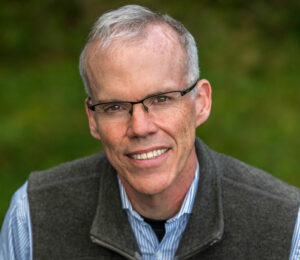 I do not know if this will be so, but Rep. Jamie Raskin has said that if we survive the “interlocking plagues of climate change, right-wing authoritarianism, and savage inequality” our future generations will – get this! – “utter the name of the New England moral visionary and activist Bill McKibben with the reverence with which we speak of Emerson, Thoreau, and Garrison.” Whew! In any case, this “graying American” looking back to figure out how the boomers and his 70s generation went astray is a great study. That it starts in his youth in Lexington, Massachusetts, is perfect.
I do not know if this will be so, but Rep. Jamie Raskin has said that if we survive the “interlocking plagues of climate change, right-wing authoritarianism, and savage inequality” our future generations will – get this! – “utter the name of the New England moral visionary and activist Bill McKibben with the reverence with which we speak of Emerson, Thoreau, and Garrison.” Whew! In any case, this “graying American” looking back to figure out how the boomers and his 70s generation went astray is a great study. That it starts in his youth in Lexington, Massachusetts, is perfect.
There is a pivotal event that happened in the town when he was a kid and I won’t spoil the show by saying anything about it, but I want to say for the record that I so admire his parents and was very glad for this fascinating glimpse into small town New England politics in the late 1960s. Kudos to local historians and small town storytellers who write booklets and make tapes and keep records and oral accounts alive in local libraries and historical societies. McKibben comes back to this episode throughout the book, but I don’t want to ruin it by saying more.
There is a part that explains, too, about the economic realities that emerged from our troubling history of white privilege. Books like Richard Rothstein’s must-read The Color of Law, Dorothy Brown’s scholarly treatise The Whiteness of Wealth, Randall Robinson’s The Debt and Ta- Nehisiha Coates’s stunning 2014 call for reparations are mentioned and it becomes clear that McKibben’s commitments to the flag, seen in his telling of his pride in raising Old Glory with his Boy Scout troop – a lovely paragraph that made me smile — are now deeply tied to true truths about economic injustice stemming from a history of institutional racism. What the hell happened? This book explains it as clearly and succinctly as any I’ve read.
I needn’t say much more about his early formation as a proud, if now sobered, US citizen but I will note this: I can’t wait to read the soon-to-be-released Richard Mouw book coming in a few weeks from 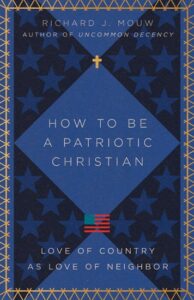 IVP on a rightly ordered love of country called How to Be a Patriotic Christian; I like and trust Rich Mouw a lot and will assume he and McKibben will have much in common in wanting to restore a glad sense of patriotism even as we know deeply the horrible aspects of our original sins. (Mouw’s subtitle is suggestive: “Love of Country as Love of Neighbor.” It is $17.00 but at our BookNotes 20% OFF sale price it’s just $13.60 — you should pre-order it now!) Look: I’m inclined to protest, or, these days, at least compliment those who do, when things go haywire. But the sort of honest lament McKibben names about our sinfulness doesn’t mean we cannot affirm the good ideas and good things that emerged from our founding as a nation. McKibben’s reflections on the flag and proper patriotism are solid and, I think, very important.
IVP on a rightly ordered love of country called How to Be a Patriotic Christian; I like and trust Rich Mouw a lot and will assume he and McKibben will have much in common in wanting to restore a glad sense of patriotism even as we know deeply the horrible aspects of our original sins. (Mouw’s subtitle is suggestive: “Love of Country as Love of Neighbor.” It is $17.00 but at our BookNotes 20% OFF sale price it’s just $13.60 — you should pre-order it now!) Look: I’m inclined to protest, or, these days, at least compliment those who do, when things go haywire. But the sort of honest lament McKibben names about our sinfulness doesn’t mean we cannot affirm the good ideas and good things that emerged from our founding as a nation. McKibben’s reflections on the flag and proper patriotism are solid and, I think, very important.
THE CROSS
Beth and I were thrilled even by the first page or so of this section where McKibben describes the character and tone of his youth group (often held in “fellowship hall”) and church camp and mission/service trip and endlessly singing songs like “Kum Ba Yah” and “Day by Day” from Godspell. (Does anybody out there remember “Pass It On”?) These were the early and mid-1970s and kids didn’t sing “praise and worship” songs like they do today. His testimony of the value of his UCC church was as wonderful to read as, well, some of the scenes in Jonathan Franzen’s Crossroads novel that I devoured last summer. His earnest mainline faith, his reading of the gospels, his telling of his own faith journey is simply delightful.
Those that have followed the nature writer, environmentalist, anti-global warming activist, and social critic, have known of his faith. He writes for Sojo and had a book published years ago (on Job, actually) by the prominent religious publisher Eerdmans out of Grand Rapids. But to hear him talk about his Sunday school teachers and his spiritual concerns as a young adult is terrific and encouraging. Importantly, his description is not offered only for the purpose of literary memoir but to make an observation, to testify, about the positive formative nature of much mainline Protestantism and the social ethic that emerged from this broad, non-fundamentalist youth ministry which so influenced him. In fact, this piece is, in many ways, a eulogy for a certain sort of healthy civil religion that allowed mainline Protestant public intellectuals (from Reinhold Niebuhr, say, to Martin Luther King to Dorothy Day) to have influence over the discourse and values of American culture.
I might want to push back in conversation about his take on mainline Protestantism although, given his framing of it – in the 60s we had Tillich and Barth and King and the brilliant William Sloan Coffin as public representatives of Jesus and in more recent times we have had the Jerry Falwells, Franklin Graham, and Trump sycophants that seem to care little for the Bible or Jesus – it is hard to argue. Hipster evangelicals mock “Kum Ba Yah” (as did Donald Trump, for that matter) but if singing that around the church camp campfire gave us the likes of Bill McKibben, I’ll take it.
McKibben is earnest, also, about his college years and it is a great grace that he sought out thoughtful Christian leaders while a student at Harvard. He is never proud or smug about this but it is clear that he was mentored, in part, by the black, Republican (and gay) preacher there, Peter Gomes. McKibben is nearly evangelistic when he wishes others would read Rev. Gomes’s book The Scandalous Gospel of Jesus: What’s So Good About the Good News?
There is little doubt that Christianity has been a hugely important influence, for better or worse, in both forming and fraying our social fabric in the last few decades. No social commentator can ignore the role of faith communities, or what we sometimes called “the religious landscape.” It is helpful that McKibben here shares both personally and more broadly, about his sense of how the Christian faith ought to be an influence for the common good. It is all so very interesting, informative and at times beautiful.
As in the previous section, he refrains from academic footnotes, but there is a fabulously interesting essay about sources and book recommendations in a final epilogue. His passion for early US history is evident and his suggestions there offer a year’s worth of reading, at least, starting, not least, with the important work of Gordon Wood (for instance, his early The Radicalism of the American Revolution.)
For the section “The Cross” he thanks his friend Diana Butler Bass (a fine church historian and contemporary writer who I mention often in BookNotes) and he commends her on-line newsletter “The Cottage.” He names the magisterial collection, The Future of Mainline Protestantism in American, edited by James Hudnut-Beumler and Mark Silk, the fabulous edited IVP volume by Mark Labberton called Still Evangelical? and he highly recommends Jemar Tisby’s The Color of Compromise. I was glad to see that he pointed readers to Kristin Kobes Du Mez’s must-read Jesus and John Wayne — again, a book that we very, very highly recommend.
THE STATION WAGON
I suppose it makes sense that McKibben uses the station wagon – indeed, one that his family owned and for which he has great affection to this day – as a symbol of the consumerism and social inequity caused by the rise of the American suburbs. I mentioned the rowdy critique of the ugliness and ecological harms of suburbia described with such wit and zeal by James Howard Kuenstler and McKibben stands in his tradition, I suppose, without any of his cynicism or rudeness. (I kept wishing for a quote from The Geography of Nowhere or Home from Nowhere.) Happily suburban bred and raised, McKibben realizes that the rise of individual homes, and the station wagons that transported the (mostly white) kids across this land in those glory days of the American Dream, became detrimental to the planet and here his passion about climate change begins to appear.
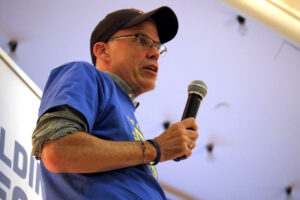 We knew it would, of course. He’s been writing about this since his 1989 breakout bestseller The End of Nature — inspired, as I recall, by his colleague Jonathan Schell’s The Fate of the Earth — and the influential Eaarth that came out, I think, in 2010. In the previous sections of The Flag, the Cross, and the Station Wagon he exposed how the lovely boyhood and middle class, churched upbringing contributed to a distorted understanding of our society and how thinks work in the world, but here – oh my. His reporting continues to shine; his prose riveting and his insight brilliant. The relationship of the flag and the cross are coming into focus and much of it is about, well, not exactly the station wagon, but the money accrued from the homes where those station wagons were parked. I know housing bubbles and interest rates and zoning battles may not seem like the sexiest topics for an entertaining nonfiction read, but trust me.
We knew it would, of course. He’s been writing about this since his 1989 breakout bestseller The End of Nature — inspired, as I recall, by his colleague Jonathan Schell’s The Fate of the Earth — and the influential Eaarth that came out, I think, in 2010. In the previous sections of The Flag, the Cross, and the Station Wagon he exposed how the lovely boyhood and middle class, churched upbringing contributed to a distorted understanding of our society and how thinks work in the world, but here – oh my. His reporting continues to shine; his prose riveting and his insight brilliant. The relationship of the flag and the cross are coming into focus and much of it is about, well, not exactly the station wagon, but the money accrued from the homes where those station wagons were parked. I know housing bubbles and interest rates and zoning battles may not seem like the sexiest topics for an entertaining nonfiction read, but trust me.
McKibben has lived this stuff, but he has also researched it well, drawing on the definitive and the most fascinating works, such as Meg Jacobs, who he thanks, for her Panic at the Pump: The Energy Crisis and the Transformation of American Politics in the 1970s.
Here, particularly, is where McKibben’s writing style makes this complicated stuff accessible – he is able to tell a story or two, bringing in a big picture analysis, and name the need for some kind of repair – all while keeping the prose light, the information interesting, the story compelling.
You see, he is showing the ways in which owning one’s home naturally creates wealth; generational wealth. Yes, certain suburban cul de sac lifestyles can cause increased pollution and alienation from place and creation, and yes, ice caps are melting due to our materialistic extravagance. But that is only the most calamitous of the implications. Along the way we got racist policies (like redlining and the gross injustice in disallowing black World War II vets access to the benefits of the GI Bill, educational opportunity, lines of credit, jobs.) Deeper wealth discrepancies developed and the economic injustices based on the rise of the US suburbs (and subsequent home ownership and banking) is damning. That he isn’t even more emphatic and prophetic in his denunciation is admirable. The social evils are so obvious in his telling, the book could have gone off the rails with screeds and anger and extremist proposals. He verges on it, but he returns to his town, the ups and downs, the good and bad, rooted in a good family and good faith and decent folks who mostly want to make a difference. The “Station Wagon” section, like the others, is a fair minded, honest critique. It is the kind of analysis that, if widely heard – that is, if this book sells well and is discussed widely – could become a compelling game-changer. We hope you consider it and order a few.
 There is another episode that McKibben comes back to from his beloved hometown. It has to do with zoning stuff, a bit arcane, admittedly, but clearly a saga of huge significance. As a specific case study of how many predominantly white towns and urban areas vote to forbid multiple family buildings being built, his Lexington story shows not only our ongoing racial segregation but the ways in which institutional racism and NIMBY style individualism effects housing, neighborhood development, and assures an unequal playing field when it comes to wealth accumulation and family stability. From liberal white suburbs like his beloved Lexington to tony, progressive neighborhoods in San Francisco with all their anti-racist placards in their little lawns, nobody wants to sacrifice what they think is their property value.
There is another episode that McKibben comes back to from his beloved hometown. It has to do with zoning stuff, a bit arcane, admittedly, but clearly a saga of huge significance. As a specific case study of how many predominantly white towns and urban areas vote to forbid multiple family buildings being built, his Lexington story shows not only our ongoing racial segregation but the ways in which institutional racism and NIMBY style individualism effects housing, neighborhood development, and assures an unequal playing field when it comes to wealth accumulation and family stability. From liberal white suburbs like his beloved Lexington to tony, progressive neighborhoods in San Francisco with all their anti-racist placards in their little lawns, nobody wants to sacrifice what they think is their property value.
And, finally, yes, this leads to more pollution and the crisis of climate change, which is deeply connected, our funky lifestyles causing, pretty darn directly, the suffering of people in low-laying parts of the globe, like the Bangladesh village he takes us two near the end of the book. It is a riveting few pages and an essential part of the story.
He writes about some of the big calculations that have been done by nonprofits such as EquoEquity that try to name the economic global impact upon the poor by our big homes and SUVs and the like. It is sobering, but his call to think about cause and consequence, about just reparations and public expenditure is rooted in a deeper sense of neighborliness. He wants to recover some of the public social ethics and prevailing communal responsibility that was actually part of the Puritan communities in his Lexington hometown’s earliest years. (Read that part, fellow Calvinists!) Our modern libertarian disinterest in the commonwealth, our retreat to private individualism, the erosion of commitments to public justice — these are what alarms him as much as rising temperatures and ocean levels.
I’m telling you, The Flag, The Cross, and the Station Wagon is a great read, and it is really entertaining to read much of it. For instance, what a blast to hear his own story of the famous solar panels installed on the White House by Jimmy Carter and famously taken down, out of spite or ideology stupidity, by Ronald Reagan. (I recall that Ed Meese called them “a joke.”) McKibben actually knew a bit about those panels as they were rescued from some Washington warehouse and ended up being used effectively at a small college in Maine. Bill tells the rest of the story, including a large Chinese business startup making more of these panels, inspired by one they got from the college in Maine, and how he got some students to create some holy trouble when they brought some of the remaining panels — still working good as new — as a gift to Obama whose people refused to meet with them, let alone put them up on the White House roof.
In retrospect, McKibben writes, sharing his disillusionment, “it was pretty clear why Obama wanted nothing to do with those solar panels: they were tainted by their association with Carter. The 1980 election, thirty years later, still dominated our politics.” Yup.
There is a final piece to The Flag, The Cross, and the Station Wagon which I will only mention briefly, but it is his big altar call / patriotic ending. It is hinted at in the story about taking college kids on the road trip – stopping for PR events along the way – to the White House to give the historic Carter-era solar panels back to the Obamas. He mentions that he truly felt bad causing the disillusionment of the youth he had brought along. It was a tell-tale line in passing, but McKibben – as the subtitle notes – is graying. And this is how he ends the book, with some remarkable stuff about how older people can become mentors for younger ones, can encourage and fund them, how our more experienced citizens can mobilize alongside the idealistic younger leaders. He has (of course he has) started a great organization to help facilitate that and it is already going strong. Check out his group, Third Act.
Mr. McKibben’s last, short chapter is inspiring, entitled “People of a Certain Age.” He is encouraged that many older people are ready to act differently. He notes that “many of us are now emerging into our latter years with skills, with more than our share of resources, and with grandchildren. Surely that might give us the capacity and the reason to help.”
After some beautiful lines about caring for our kids and grandkids, McKibben continues,
But older people have something beyond their kids and grandkids to think about. We also have the chance to partially redeem some sense of our history, and, for those to whom it matters, as Christians. Conservative political leaders try to do this by suppressing the truth – hence all those bills about banning the teaching of the 1619 Project, and, indeed all “critical race theory,” out of schools was premised on the idea that telling such truths “attempt to deny or obfuscate the fundamental principles upon which the US was founded.” I doubt very much whether this strategy will work: I think the actual blood on which America was too much founded will keep seeping through whatever whitewash we assiduously apply. I think the only way to make our heritage any better is to make our present and future better: if we change decisively in the direction of inclusion and fairness, then perhaps history – taking a very long view – will see something laudable in the promise that “all men are created equal” or in the Gospel injunction to love one’s neighbor; perhaps if we install enough solar panels, then the American science and engineering of the twentieth century (which birthed those miraculous devices) will be remembered for more than making the comfortable more so.
And so, dear readers of any age, I invite you to consider this great summer read, an informative and illuminating book written as a sweet memoir, a story of this ecological activist’s youth, his steadfast patriotism, his continued faith, his call for living in a manner that is equitable, inclusive, and sustainable. He loves our flag, Christ’s cross, and his parent’s old station wagon. In his capable hands, they become icons of a sort, pointing us beyond themselves to great problems, from race to wealth to climate change, and, yet, also, to great possibilities of redemption. It’s a book I couldn’t put down. In clever prose and fine storytelling, he tells us what in the hell went wrong and what we all – especially those of us who are graying – can do.
a few others that come to mind, highly recommended to pair with McKibben
 The Flag + The Cross: White Christian Nationalism and the Threat To American Democracy Philip S. Gorski & Samel L. Perry (Oxford University Press) $21.95 OUR SALE PRICE = $17.56
The Flag + The Cross: White Christian Nationalism and the Threat To American Democracy Philip S. Gorski & Samel L. Perry (Oxford University Press) $21.95 OUR SALE PRICE = $17.56
This brand new book is from the prominent academic press, Oxford, and yet is readable and feisty. The authors are known in this genre of studying the relationship of Christianity and democracy and have written elsewhere about the rise of the authoritarian American right. With vibrant recommending blurbs by historians like Kristin Kobes Du Mez and Anthea Butler, and a foreword by fellow historian Jemar Tisby, these authors have given us a slim book that is potent and important. I don’t have to explain how important this is.
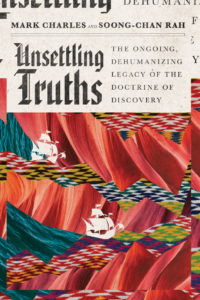 Unsettling Truths: The Ongoing, Dehumanizing Legacy of the Doctrine of Discovery Mark Charles and Soong-Chan Rah (IVP Academic) $20.00 OUR SALE PRICE = $16.00
Unsettling Truths: The Ongoing, Dehumanizing Legacy of the Doctrine of Discovery Mark Charles and Soong-Chan Rah (IVP Academic) $20.00 OUR SALE PRICE = $16.00
We have written about this before as one of the several books that explore the so-called theological and legal basis for the stolen land, genocide, and other sorts of mistreatment of first nations people groups in North America. McKibben’s book refers to this a bit and admits he might have explore it more. This is an essential volume in this history, informative and passionate.
Here is an endorsement from the preeminent Christian historian, Mark Noll,
Why should I endorse a book when I do not agree with some of its historical judgments? Answer: for the same reason you should read it. Charles and Rah attack a pernicious principle (the Doctrine of Discovery), review an evil history (the United States’ treatment of Native peoples), challenge a persistent stereotype (American exceptionalism), and psychoanalyze white America (in denial about the nation’s history). The entire book, even when you think things could be evaluated differently, will make you think, and think hard, about crucially important questions of Christian doctrine, American history, and God’s standards of justice.–Mark Noll, author of America’s Book: The Rise and Decline of a Bible Civilization, 1794-1911
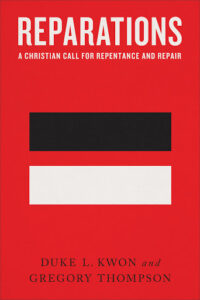 Reparations: A Christian Call for Repentance and Repair Duke L. Kwon & Gregory Thompson (Brazos Press) $24.99 OUR SALE PRICE = $19.99
Reparations: A Christian Call for Repentance and Repair Duke L. Kwon & Gregory Thompson (Brazos Press) $24.99 OUR SALE PRICE = $19.99
I have written about this before hoping to persuade customers to pick it up. Of the hundreds of books about racial justice that we stock, this is one of the most important, well-written, interesting, informative, theologically and Biblically faithful, compelling, and a fabulous call to action, pleading with us to become agents of repair. If you read this with or after McKibben, you will be glad you did.
Reparations is passionate, clear, smart, thoughtful, and blessedly troubling. I hope every American Christian leader — especially White Christian leaders — will read it because it is truly the rare book that, if taken up with an open heart, has the potential to change the world.
— Tish Harrison Warren, Anglican priest; author of Liturgy of the Ordinary and Prayer in the Night
What hope do we have of racial reconciliation unless we right the wrongs of our past? Kwon and Thompson have argued convincingly that reparations is a necessary part of the healing of our churches and our nation, and that people of faith should be leading the way. Read this book and learn how to be a bridge builder…”
— Latasha Morrison, author of Be the Bridge: Pursuing God’s Heart for Racial Reconciliation
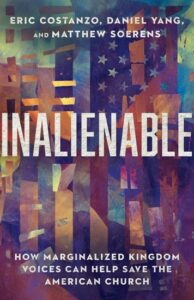 Inalienable: How Marginalized Kingdom Voices Can Help Save the American Church Eric Costanzo, Daniel Yang, and Matthew Soerens (IVP) $18.00 OUR SALE PRICE = $14.40
Inalienable: How Marginalized Kingdom Voices Can Help Save the American Church Eric Costanzo, Daniel Yang, and Matthew Soerens (IVP) $18.00 OUR SALE PRICE = $14.40
To follow up McKibben, many of us will want to, naturally, reflecting on his own faith journey, ponder our own. Have Jesus’s own counter-intuitive values and teachings and the Biblical narrative towards restoration and healing of the cosmos become the story that has shaped our lives? How has the evangelical renewal from the Jesus Movement of the 60s on down through the last decades of the 20th century and the rise of everything from contemporary worship and megachurches and missional theology and liturgical spiritually and moral majorities and gospel coalitions and all that has changed in recent years effected your own faith. (Have you, like Diana Butler Bass, in her amazing book Freeing Jesus that I have talked about here often, seen a change in your understanding of Jesus, his nature and work and presence in your life?) There are hundreds of great books, many quite new, that offer fresh and needed insight about the ongoing work of growing in faith and fidelity. Here is one important one.
Here is how the publisher describes it: “With our witness compromised, numbers down, and reputation sullied, the American church is at a critical crossroads. In order for the church to return to health, we must decenter ourselves from our American idols and be guided by global Christians and the poor, who offer hope from the margins, and the ancient church, refocusing on the kingdom, image, Word, and mission of God.”
There are lots of very enthusiastic supporters of this book. Here’s one by Jenny Yang, a fine example of why many leaders realize we need this book:
The church is flourishing in many parts of the world today, but it’s easy for those of us in the West to feel a sense of hopelessness as we see the churches we attend, love, and perhaps lead mired in scandals, materialism, consumerism, and nationalism. Our brothers and sisters around the world, however, are tackling the challenges of poverty, forced migration, trafficking, and natural disasters, pointing a broken world to a better way, and we in the Western church have so much to learn and receive about the good news being proclaimed in both word and deed from the broader church. This book helps us do just that, sharing the incredible work that God is doing around the world, pointing us to a better way to listen and learn from our brothers and sisters who are living out the ways and truths of Jesus to transform their communities and ultimately point people to Christ. The Bible is the story of God centering those on the margins, and this book teaches us as the church to do the same — Jenny Yang, senior vice president for advocacy and policy for World Relief and coauthor of Welcoming the Stranger
 A Sort of Homecoming: Essays Honoring the Academic Work and Community Work of Brian Walsh edited by Marcia Boniferro, Amanda Jagt & Andrew Stephens-Rennie (Pickwick Publications) $34.00 OUR SALE PRICE = $27.20
A Sort of Homecoming: Essays Honoring the Academic Work and Community Work of Brian Walsh edited by Marcia Boniferro, Amanda Jagt & Andrew Stephens-Rennie (Pickwick Publications) $34.00 OUR SALE PRICE = $27.20
This is another rare and stellar volume that I have highly recommended several times and it comes to mind, again, now. This is a book of essays, almost all simply extraordinary, all done to honor the retirement from campus ministry (at the University of Toronto) of Brian Walsh. Brian has done worldview studies, postmodern theology, written about eco-theology and just economics, He has been a scholar in residence at a homeless shelter and created innovative Biblical liturgies for early morning prayer groups at the U of T. He and his wife, Biblical scholar Sylvia Keesmaat have written two unforgettable, subversive Bible commentaries — un-commentaries, we might call them — called Colossians Remixed and Romans Disarmed. If anybody has a voice to consider as an alternative to the religious mess McKibben writes about, it is Walsh and his friends and extended community.
These thought-provoking and important pieces offered in tribute to his work as scholar, activist, and organic farmer, are about faith and Scripture and economics and justice. It is about housing and home, about faithful ways of living well in this world. It is a book that offers heady perspectives that are perhaps more breathy and zealous that McKibben’s clear-headed prose, but it is just what he needs to follow up with a sustainable sort of faith that is deeply Biblically and faithful to the homelessness in this broken world. I think many of our BookNotes friends need this vision as well. We recommend this a lot.
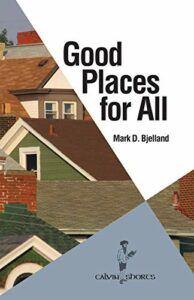 Mark D. Bjelland (Calvin College Press) $9.99 OUR SALE PRICE = $7.99
Mark D. Bjelland (Calvin College Press) $9.99 OUR SALE PRICE = $7.99
This short book is part of the series by Calvin University professors called “Calvin Shorts.” (And, yes, there is a funny little logo of John Calvin in short pants. Ha!)
Each of the many books in this good series offer brief, solid, insight for ordinary readers giving a bit of the practical application of the scholarly research of the college scholars. Dr. Bjelland, for instance, is a Professor of Geography and Environmental Studies and his academic training and research is on how his ecological concerns might influence urban planning (and even engineering.) He has studied urban geography in Europe and the UK and here offers a beautiful, readable summary of a theology of place, a biblical framework for imagining how cities, neighborhoods, housing markets, and transportation systems work, and should work. We should care about zoning codes and local politics and neighborhood associations and real estate development — as Bill McKibben’s book suggests over and over. Good Places for All is a good example of thinking Christianly about hospitality and places.
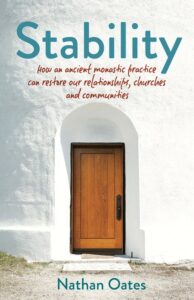 Stability: How an Ancient Monastic Practice Can Restore Our Relationships, Churches, and Communities Nathan Oates (Paraclete Press) $16.99 OUR SALE PRICE = $13.59
Stability: How an Ancient Monastic Practice Can Restore Our Relationships, Churches, and Communities Nathan Oates (Paraclete Press) $16.99 OUR SALE PRICE = $13.59
McKibben rightly critiques the consumerism and wasteful lifestyles of our times and he is right to do so. Many of us learned years ago from the like of Ron Sider and his unforgettable Rich Christians in an Age of Hunger that materialism and excessive financial wealth can be idolatrous and that any faithful reading of the Bible should give us pause about our way of living. McKibben looks at accrued wealth from mortgages and bank loans and credit and that big picture stuff that goes with the rise of suburbia. He isn’t harsh and he doesn’t directly go after our constant moving and upward mobility which is part and parcel of this American Dream.
Oates, an evangelical pastor rooted in the monastic tradition, very nicely takes us in that direction, drawing on the old Benedictine virtue of stability. Staying put, Caring about place, community, the common good of our own neighborhood. It’s sort of a spiritual sort of localism and it is a fine, fine book, inspiring and wise.
Nathan Oates is a modern prophet who has written a refreshing and important book. He does more than offer a critique of modern culture. Indeed, drawing upon the Bible and visions of St. Benedict, Oates shows us ways to reject toxic consumerism and replace it with a life-giving work of restoration. — Rev. Dr. Lyle Dorsett, Billy Graham Professor of Evangelism (ret) at Beeson Divinity School, Birmingham, AL
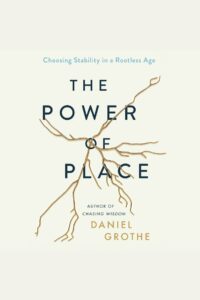 The Power of Place: Choosing Stability in a Rootless Age Daniel Grothe (Thomas Nelson) $25.99 OUR SALE PRICE = $20.79
The Power of Place: Choosing Stability in a Rootless Age Daniel Grothe (Thomas Nelson) $25.99 OUR SALE PRICE = $20.79
Again, I needn’t say much about this because I have reviewed it at length at BookNotes. Consider this your reminder to consider this, one of the best books on our big lists of Best Books of 2021. Grothe is a surprising writer, a small-time farmer mentored by Eugene Peterson (and the printed pages of Wendell Berry) who pastors a large, evangelical church in Colorado Spring. He’s a wise and good writer, reminding us not just of the virtue of stability (as the lovely Nathan Oates book, above, does) but to actually love our places, to be intentional about cultivating a lifestyle shaped by the contours of your own geography and local culture.
As Pete Greig says, “I can’t recommend The Power of Place highly enough. Everyone needs to read it! It is beautifully written, compellingly argued, and urgently necessary for a rootless generation like our own.”
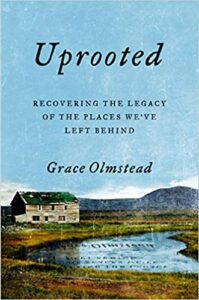 Uprooted: Recovering the Legacy of the Places We’ve Left Behind Grace Olmstead (Sentinel) $27.00 OUR SALE PRICE = $21.60
Uprooted: Recovering the Legacy of the Places We’ve Left Behind Grace Olmstead (Sentinel) $27.00 OUR SALE PRICE = $21.60
Although McKibben’s story is centered around the well trimmed homes of his small-town, upper-middle class New England town, some folks live neither in upscale towns or bland, ex-urbs. In fact, many folks are rural, hurting from brain-drain and dislocation. This is exactly the sort of place Grace Olmstead grew up and left. This beautifully written book — another that we’ve raved about here before — is her study of her town in rural Idaho and how many who moved away lost connection.
The stellar blurbs on the back of this wonderfully written book come from Sarah Smarsh (author of Heartland) and Chris Arnade (author of Dignity) and the ever-important Norman Wirzba, author of the soon to be released Agrarian Spirit: Cultivating Faith, Community, and the Land. McKibben surely knows much about this literature and the deeply human need for roots. He knows that recovering belonging and stewardship and a sense of place are aspects of a renewed sort of way of life that will help mitigate the climate disaster.
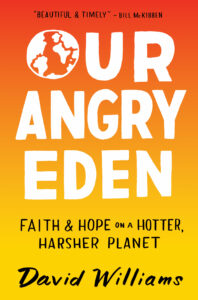 Our Angry Eden: Faith & Hope on a Hotter, Harsher Planet David Williams (Broadleaf Books) $26.99 OUR SALE PRICE = $21.59
Our Angry Eden: Faith & Hope on a Hotter, Harsher Planet David Williams (Broadleaf Books) $26.99 OUR SALE PRICE = $21.59
I’m sure I named this as one of our Best Books last year and I know I’ve suggested it to anyone asking about the topic of understanding the urgent matters of a changing climate. God’s creation seems to have gotten even more angry since this book came out two years ago and so we recommend it now with a great urgency than before. It is, as it says on the back, “an unflinching yet hopeful call to faithful action.” Indeed, in Bill McKibben’s rave endorsement he says it shows how there’s “plenty we can be doing to fit in better with creation. Read it and change!”
But here is what is also interesting (recalling my opening monologue about nonfiction books that are well written, full of gravity and grace, informative and fun.) McKibben calls Our Angry Eden “beautiful.” Isn’t that interesting — a title that sounds scary (and comes to us in a flaming, hot orange color scheme) is considered beautiful? That is some of what I said about it when I first reviewed it at BookNotes — it surprised me how down to Earth it was, how much I liked the rather pastoral tone of the small town preacher. Yes we have abused the creation and yes the Biblical witness is that the creation is afflicted, “groaning” as Romans 8 has it. But despite the moral crisis of our abuse of creation and its own anger, seen in the ugly facts of the hard science, Rev. Williams is mostly gracious, more hopeful than I expected, and pretty artful in his own telling of the tale. He is a novelist, after all — you’ve got to read his oddball post-apocalyptic story When the English Fall which involves the Amish.
Our Angry Eden by David Williams is a must-read. With clear-eyed honesty and a perceptive analysis of the existential threat of the climate crisis, Williams forces us to face the mess we are in, but he also conjures hope through lively storytelling, biblical insight galore, and sound practical ideas that embody God’s good future. — Steve Bouma-Prediger, author of For the Beauty of the Earth: A Christian Vision for Creation Care and Earthkeeping and Character: Exploring a Christian Ecological Virtue Ethic
In a time when the words climate emergency send many people into a panicked despair or an overwhelmed paralysis, David Williams offers a third way. This book gives attainable, tangible ways to engage, while spreading out a rich theological foundation for how to love our neighbor as we care for our earthly home. — Anna Woofenden, author of This Is God’s Table: Finding Church Beyond the Walls and founder of The Garden Church
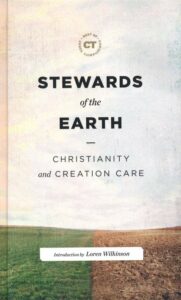 Stewards of the Earth: Christianity and Creation Care introduction by Lorin Wilkinson (Lexham Press) $22.99 OUR SALE PRICE = $18.38
Stewards of the Earth: Christianity and Creation Care introduction by Lorin Wilkinson (Lexham Press) $22.99 OUR SALE PRICE = $18.38
This collection from the outstanding “Best of Christianity Today” series is exceptionally important and useful for at least three reasons. Firstly, it problematizes, as they say nowadays (I have my tongue in cheek as I hate that word) the narrative, partially assumed by Bill McKibben, above, that Christianity in general and evangelicalism, particularly, has been all shallow and worldly and fundamentalist and captive to the religious right or, at least churchy and spiritual and not very involved in stuff that matters. Christianity Today, now known as CT, is perhaps the flagship magazine of evangelicalism, not terribly fundamentalist (they hate them for being too liberal) and yet not progressive like Sojo, say. As Christian Century is to the mainline denominational churches and orientation, so CT channels the more moderate, often thoughtful, evangelical vision. For fifty years they have been writing — perhaps not enough, and perhaps sometimes in their own quirky way — about environmentalism, Earth-keeping, creation care, ecological ethics. This handsome hardback collects these five decades worth of essays, articles, interviews. It shows the diversity and the development of evangelical perspectives.
So, firstly, it is a good window into what some evangelicals have thought and publicly said. It makes clear that evangelicalism, at least insofar as they are represented by CT, even if not always where it should have been, has been addressing contemporary social issues since their founding. The many editorials are here, and it shows some initial suspicions about the green movement, and increasingly the editorials are more faithfully engaged with the theology of creation care.
Secondly, many of these pieces are very, very good, sane, Biblical, inspiring, and needed yet today. Some writers in progressive social ethics journals write in odd ways with lingo and cadences that are not congenial to ordinary Bible-beliving people, and these essays often just shine. That is, they may be compelling to the perhaps unconvinced. Here you will find Bill McKibben (yes, in CT), Ron Sider, Leslie Leyland Fields, Andy Crouch. Tim Stafford’s marvelous piece on Cal DeWitt is here, respected global surgeon Paul Brand is here, there is an interview with Eugene Peterson.
The book’s contributors, granted, are almost entirely white and mostly male. The magazine’s makeup and vision is somewhat different even today. But these are good pieces and we wanted you to know about them. Kudos.
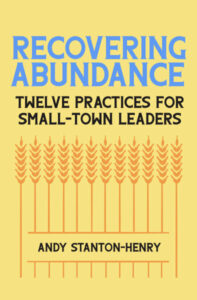 Recovering Abundance: Twelve Practices for Small-Town Leaders Andy Stanton-Henry (Fortress Press) $22.00 OUR SALE PRICE = $17.60
Recovering Abundance: Twelve Practices for Small-Town Leaders Andy Stanton-Henry (Fortress Press) $22.00 OUR SALE PRICE = $17.60
This is a book that deserves a longer review but, for now, I just wanted to suggest it as a companion to the remarkable call to local action in the memoir by McKibben. He ends that book invite others — especially older folks — to be involved alongside others in the global effort to mitigate the crisis of climate change. This will involve speaking out about everything from community development to banking practices, from congregational mission strategies to racial justice initiatives, from recycling projects to land use questions.
We obviously need people of faith to care about their places, to be increasingly engaged in gracious and caring justice actions grounded and informed by thoughtful public theology. What does it mean for a local Christian leader — say, a pastor — to also become an advocate for place, caring about small town contexts and speaking out about rural and small town community flourishing? We need all kinds of resources to help us on our way — we could hardly do any better than the great book Agents of Flourishing: Pursuing Shalom in Every Corner of Society by Amy Sherman that I highlighted about a month ago. This one, though, specifically offers practices for small town leaders. There is nothing quit like it and I love it. Kudos one and all.
TO PLACE AN ORDER
PLEASE READ AND THEN CLICK ON THE “ORDER HERE” LINK BELOW.
It is helpful if you would tell us how you prefer us to ship your orders. The weight and destination of your package varies but you can use this as a general guide.
There are generally two kinds of US Mail options, and, of course, UPS. If necessary, we can do overnight and other expedited methods, too. Just ask.
- United States Postal Service has the option called “Media Mail” which is cheapest but can be slow. For one typical book, usually, it’s about $3.50.
- United States Postal Service has another option called “Priority Mail” which is $8.35 if it fits in a flat rate envelope. Many children’s books and some Bibles are oversized so that might take the next size up which is $8.95. “Priority Mail” gets much more attention than does “Media Mail” and is often just a few days to anywhere in the US.
- UPS Ground is reliable but varies by weight and distance and may take longer than USPS. We’re happy to figure out your options for you once we know what you want.
– DON’T FORGET TO LET US KNOW WHAT SHIPPING METHOD YOU PREFER –
BookNotes
SPECIAL
DISCOUNT
20% OFF
ALL BOOKS MENTIONED
+++
order here
this takes you to the secure Hearts & Minds order form page
just tell us what you want to order
inquire here
if you have questions or need more information
just ask us what you want to know
Hearts & Minds 234 East Main Street Dallastown PA 17313
read@heartsandmindsbooks.com
717-246-3333
It is complicated for us, but we are still closed for in-store browsing due to our commitment to public health (not to mention the safety of our staff and customers.) The vaccination rate here in York County is sadly lower than average and the new variant is now spreading. Our store is a bit cramped without top-notch ventilation so we are trying to be wise and faithful.
Please, wherever you are, do your best to be sensitive to those who are most at risk. Many of our friends, neighbors, co-workers, congregants, and family members may need to be protected since more than half of Americans (it seems) have medical reasons to worry about longer hazards from even seemingly mild Covid infections.
We are doing our famous curb-side customer service and can show any number of items to you if you call us from our back parking lot. We are eager to serve and grateful for your patience as we all work to mitigate the pandemic.
Of course, we’re happy to ship books anywhere. Just tell us how you want them sent.
We are here 10:00 – 6:00 EST / Monday – Saturday, closed on Sunday.

